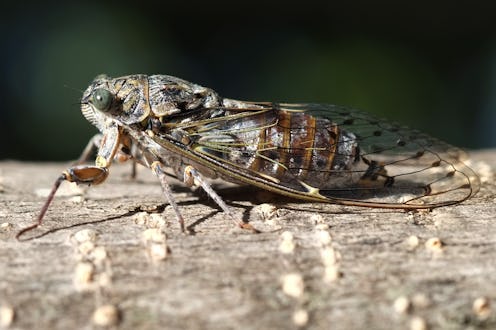Life
This Is Why Cicadas Sing
If you live in the continental United States, chances are you spend every spring pondering the same question: Why do cicadas sing? Although many cicada species spend most of their not-so-brief lives underground, the insects more than make up for lost time when they do emerge — namely, by droning as loudly and creepily as possible. The sound, which is best described as "futuristic space ship meets badly-tuned radio," wouldn't be out of place as a sound effect in a horror movie. In fact, as someone born in the deep South, I can't count the number of times the combination of cicada calls and the croaking of frogs convinced me that I was about to be abducted by aliens from my own backyard. (To quote my school psychologist, I was an imaginative child.)
So what's the science behind the ultra-creepy noises cicadas make? As with most things related to the animal kingdom, it has to do with attracting a mate. According to Cicada Mania, male cicadas spend most of their short adult lives looking for a female with whom they can make some babies. After emerging from the soil, which occurs annually, every 13 years, or every 17 years depending on the species, male cicadas mature from nymphs into adults and start singing to attract a lady friend; once they've mated, she lays the eggs in a tree and the cycle continues. By the way, according to the Washington Post, male cicadas keep singing until the bitter end.
The Post further reports that the sound is produced by panels beneath a cicada's wings; known as tymbals, these panels vibrate rapidly to create the droning sound, which is then amplified by the insect's mostly-hollow body.
A single cicada can be loud, but they're practically deafening in the form of a swarm — and unfortunately, according to the U.S. Department of Agriculture, a new brood emerges somewhere pretty much every year. Interestingly enough, cicada songs are generally specific to the species and individual insects; what we think of as a "cicada call" is usually a blend of the sounds an entire swarm makes.
There you have it! If you live in the northeastern United States, now you know a little more about the billions of visitors you're expected to see in the next few weeks. Just don't get too attached to your new friends — adult cicadas tend to die off within six weeks of reaching maturity. Whomp, whomp.
